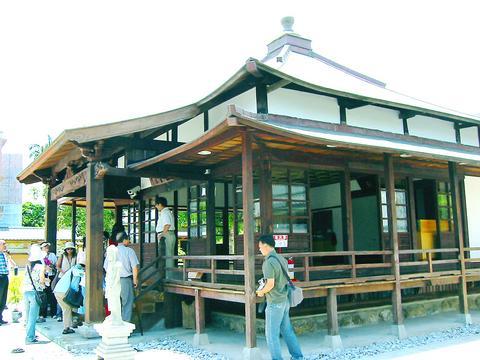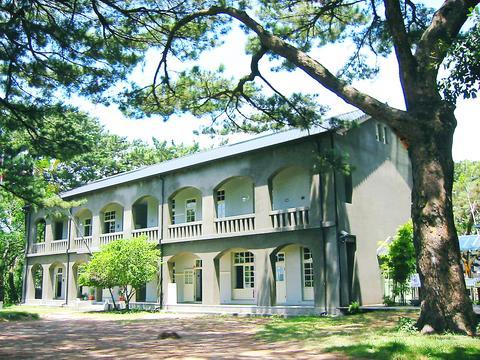With an exemplary new tour route of its abundant historical sites, Hualien County is ready to unfold its charm and spectacular scenery to visitors.
The tour is one of six routes that are being promoted by the Council for Cultural Affairs (CCA), to encourage local and foreign tourists to learn more about the nation's culture through its architectural heritage. The other tours will take visitors to sites in Jinmen County, Penghu County, Tainan, northern Taiwan and Taichung.

PHOTO: JEWEL HUANG, TAIPEI TIMES
The Council for Cultural Affairs (CCA) is marking about 500 historical sites around the country with a round logo and organizing this architecture as tourist spots in the "Tour of Taiwan's Classical Historical Buildings." The tour is a key project that the CCA started promoting this month, aiming to implement the Cultural Citizenship Campaign and the Citizens' Esthetics Movement, two policies initiated by Chen Chi-nan (

PHOTO: JEWEL HUANG, TAIPEI TIMES
"There are many historical buildings which may not be old enough to be preserved as national historic spots, but they tell us so many stories about this land," Chen said at a news conference last week announcing the debut of the tour. "They are like chapters of the history of Taiwanese culture," Chen said.
Chen said the new tours tap into the Cultural Heritage Preservation Law's (
One of the six routes on the tour will visit Hualien's old buildings, and reveal the county's complicated cultural and historical legacy left by its diverse residents over the past 300 years -- who include Aborigines, Japanese, Hakka, Hoklo and Mainlanders.
"In addition to its famous Taroko National Park, Hualien is a wonderland of diverse cultures and ethnic groups," said Ruan Chang-rui (
The CCA has launched a website for people who are interested in the tour, at http://hbtravel.cca.gov.tw. The council especially recommends the following historical sites to tourists who want to get acquainted -- or re-acquainted -- with Hualien.
Pine Garden
Built in 1943, Hualien City's Pine Garden used to be the military base for the Japanese Navy stationed there during World War II. Soon it became a recreational resort for high-ranking Japanese officers. It was said that the Pine Garden was the place where kamikaze pilots would drink the wine bestowed by the Japanese emperor on the eve of their suicide missions, according to the manager of Pine Garden, Lin Cheng-tsung (
With nearly 200 pines, the tranquil garden faces the estuary of the Meilun River to the Pacific Ocean. After being restored by the Hualien County government, the garden was officially recognized as one of Taiwan's "top 100 historic charms" in 2001. It features afternoon tea for tourists.
Ching-shiu Temple
Built in Jian in 1917 by Japanese immigrants, Ching-shiu Temple is the only Japanese temple that is completely preserved in Taiwan. Chian township (
There are 88 stone Buddhas moved from the same number of temples in Shikoku, according to Huang Jung-tun (
Tobacco-roasting Houses
About 35 old tobacco-roasting houses in Fenglin recall the once-booming tobacco industry, which began during the period of Japanese rule.
However, although realizing the historical value of the tobacco-roasting houses, the Hualien city government has not yet restored these old buildings because of insufficient funds in their budget.
Old house of Fataan Tribe
Built in Kuangfu between 1924 to 1929 by Bawon Buting, a chieftain of Fataan Tribe, an Amis tribe in Hualien County.
The old tribe house reveals the matriarchal tradition of the Amis tribes.
The house was divided by the daughters of Bawon Buting, and most of the utensils used since as far back as the 1930s have been well preserved.

Alain Robert, known as the "French Spider-Man," praised Alex Honnold as exceptionally well-prepared after the US climber completed a free solo ascent of Taipei 101 yesterday. Robert said Honnold's ascent of the 508m-tall skyscraper in just more than one-and-a-half hours without using safety ropes or equipment was a remarkable achievement. "This is my life," he said in an interview conducted in French, adding that he liked the feeling of being "on the edge of danger." The 63-year-old Frenchman climbed Taipei 101 using ropes in December 2004, taking about four hours to reach the top. On a one-to-10 scale of difficulty, Robert said Taipei 101

Nipah virus infection is to be officially listed as a category 5 notifiable infectious disease in Taiwan in March, while clinical treatment guidelines are being formulated, the Centers for Disease Control (CDC) said yesterday. With Nipah infections being reported in other countries and considering its relatively high fatality rate, the centers on Jan. 16 announced that it would be listed as a notifiable infectious disease to bolster the nation’s systematic early warning system and increase public awareness, the CDC said. Bangladesh reported four fatal cases last year in separate districts, with three linked to raw date palm sap consumption, CDC Epidemic Intelligence

US climber Alex Honnold left Taiwan this morning a day after completing a free-solo ascent of Taipei 101, a feat that drew cheers from onlookers and gained widespread international attention. Honnold yesterday scaled the 101-story skyscraper without a rope or safety harness. The climb — the highest urban free-solo ascent ever attempted — took just more than 90 minutes and was streamed live on Netflix. It was covered by major international news outlets including CNN, the New York Times, the Guardian and the Wall Street Journal. As Honnold prepared to leave Taiwan today, he attracted a crowd when he and his wife, Sanni,

Taiwanese and US defense groups are collaborating to introduce deployable, semi-autonomous manufacturing systems for drones and components in a boost to the nation’s supply chain resilience. Taiwan’s G-Tech Optroelectronics Corp subsidiary GTOC and the US’ Aerkomm Inc on Friday announced an agreement with fellow US-based Firestorm Lab to adopt the latter’s xCell, a technology featuring 3D printers fitted in 6.1m container units. The systems enable aerial platforms and parts to be produced in high volumes from dispersed nodes capable of rapid redeployment, to minimize the risk of enemy strikes and to meet field requirements, they said. Firestorm chief technology officer Ian Muceus said